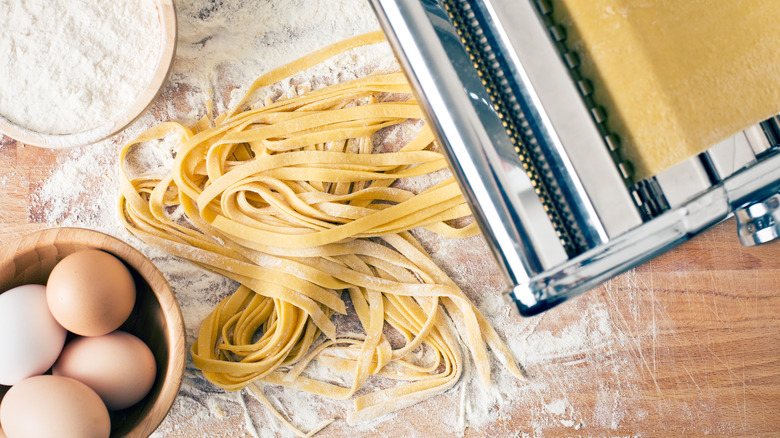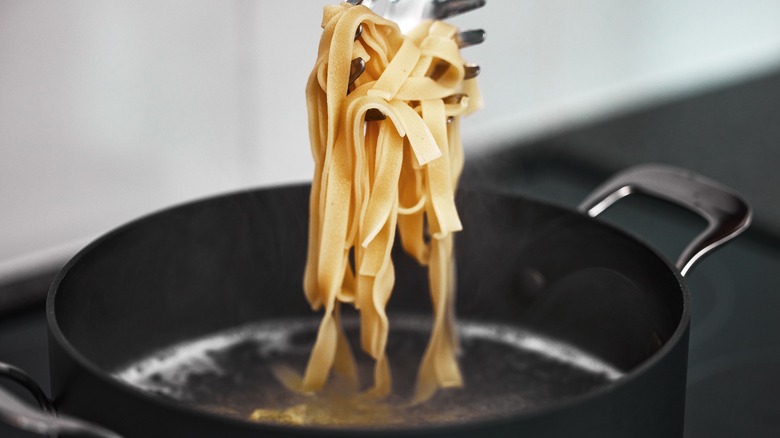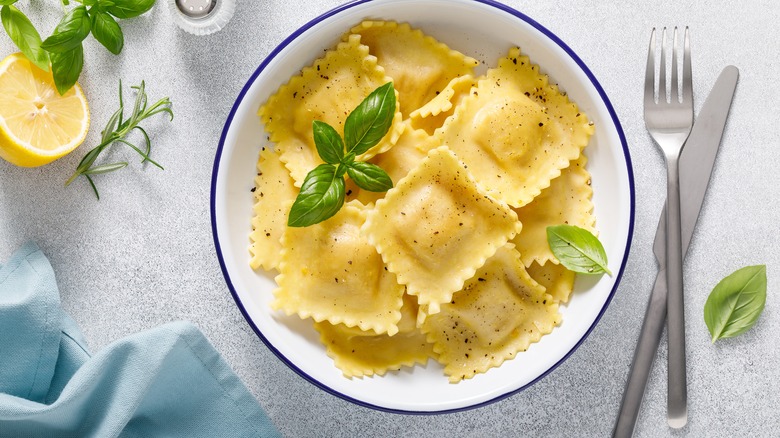The Cook Time For Your Fresh Pasta Isn't What You Think
It's hard to imagine ever getting enough when it comes to silky, perfectly sauced, satisfying fresh pasta. But when cooking that fresh pasta, you can very easily underestimate just how little time it takes. As simple as making fresh pasta dishes can be, it's dangerously easy to overcook them.
While dried pasta typically comes with a recommended cook time right on the package, fresh pasta — especially if hand-made or purchased from a small batch producer to order — may not have such instructions. Depending on the thickness and type of pasta, as well as factors like the fullness of your pot and how hard your water is boiling, it may cook as quickly as two minutes. This is a big difference from the eight to 12 minutes (or more) that dry pasta might require. Regardless of what kind you've got in your pot when considering how to cook fresh pasta, the most reliable strategy to avoid a gummy, mushy mess is to trust your senses and taste for doneness.
Cooking pasta to perfection
Advice for cooking pasta is almost always to aim for an al dente texture. But when you consider what al dente really means, it's not possible for fresh pasta because there's too much moisture already present. Dried pasta starts hard and softens as it cooks, but fresh pasta is fairly soft from the start, and will only become more so as it boils. You'll know fresh pasta is done when it has a tender and delicate texture with no stickiness. Gauging that sweet spot can only be done by taste.
Sampling your pasta early on in the cooking process is critical. After about two minutes, grab a piece with tongs or a long fork, allow it to cool enough not to burn your mouth, and give it a taste. If it's not quite to your liking, try again — as frequently as every 15 to 20 seconds.
Also, remember that your fresh pasta will cook beyond the pot. Residual heat will continue the process even while you strain your noodles. And if you're serving with a sauce, you may want to drain a few minutes early, and then finish the dish by sautéeing pasta in the sauce.
More fresh pasta cooking tips
There are countless kinds of fresh pasta, and the shape will influence how long it needs to be boiled. Strands like fettuccine, pappardelle, and linguini can be finished in a flash — even as fast as 30 to 90 seconds. Filled pasta like ravioli may require a bit longer, depending on the thickness of the dough, and a meat filling could require as long as 13 minutes to ensure it's thoroughly and safely cooked.
To ensure the best possible cooked pasta, give it enough space in the pot, too — about 6 quarts of water per pound of pasta — so it has ample room to cook evenly and avoid clumping. And be gentle with your fresh pasta; since it's not as sturdy as the dried stuff, it should be simmered and not aggressively boiled. Also, instead of inverting your pot's contents into a colander when it's time to strain, opt for a gentler strategy, and use a slotted spoon, spider, or skimmer to remove the delicate pasta.
When it comes time to sauce and serve, you can let fresh pasta shine by opting for a lighter sauce, like a bright and zippy tagliatelle with citrus sauce. Once you get the hang of the ideal cook times for your fresh pasta, you'll have no reason not to enjoy it at a moment's notice.


